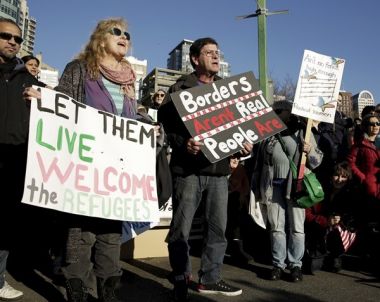U.S. toughens requirements in visa waiver programme after Paris terror attacks

In a bid to keep out potential terrorists from the homeland, the Obama administration is now requiring countries participating in the visa waiver programme to provide information about the thousands of their nationals visiting the United States, including those who traditionally enjoy visa-free travel to the country.
The White House announced the "enhancements'' to the U.S. Visa Waiver Programme (VWP) on Monday after President Barack Obama visited Paris for the climate conference just two weeks after terror attacks rocked the French capital and left 130 people dead, NBC news reported.
"Where we have opportunities to make meaningful enhancements we won't hesitate," White House spokesman Josh Earnest told reporters gathered in Paris for the U.N. climate change summit on Monday. "We are clear eyed about the stakes."
The programme, which is nearly 30 years old, helps bring around 20 million people from 38 countries — most of them in Europe — to the U.S. ever year with less stringent screening.
The new changes to the programme include screening whether travelers have visited countries considered as "terrorists safe havens'' and working with countries participating in the visa waiver programme to help collect and use biometric screening.
Earnest characterised the "enhancements'' as a move that would stymie terrorists who try to use lost or stolen passports to travel, the report said.
The U.S. government will also move up the deadline for all VWP travellers to begin using passports with embedded security chips and seek to establish customs checkpoints in seven VWP countries, where passengers and their baggage could be inspected before entering the U.S.
Somalia, Mali, Egypt, Iraq, Lebanon, Libya, Yemen, Afghanistan, Pakistan, Columbia and Venezuela are the countries considered to be terrorist havens based on the 2014 report of the State Department, RT reported.
The new initiative also requires government agencies, including the Department of Homeland Security (DHS), State Department, FBI and the U.S. intelligence community to work closely together to deploy "foreign fighters surge teams'' to try to counter the travel of terrorists in certain countries.
The director of the DHS and the National Intelligence is also mandated to regularly identify and review terrorist safe havens, keep the information up to date for the purpose of traveller risk assessments.
The latest initiative said that while most of the countries participating in the VWP are in Europe, it also applies to Australia, Brunei, Chile, Japan, New Zealand, Singapore, South Korea and Taiwan.
The changes in the VWP were prompted by oppositions from governors and lawmakers in Congress against plans to accept an additional 10,000 Syrian refugees over the next fiscal year.
"We are doing everything we can to ensure that the threat of foreign fighters or individuals who have been radicalised does not make its way to our homeland,'' said deputy National Security Adviser Ben Rhodes.
"We want to ensure that we have tighter scrutiny in place, better information sharing,'' he added.











